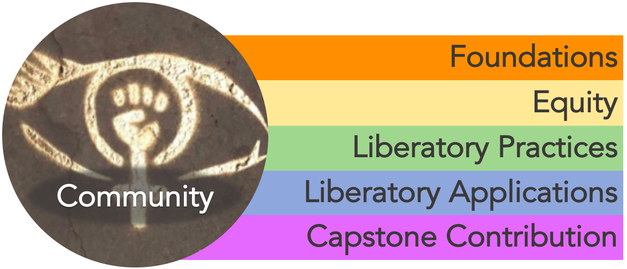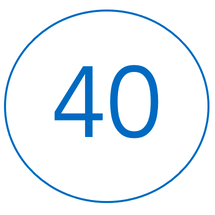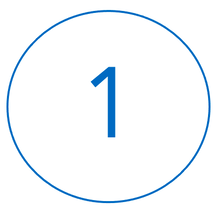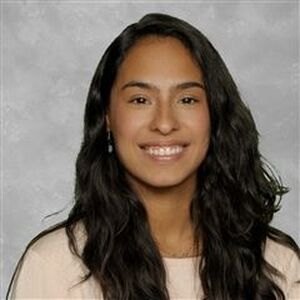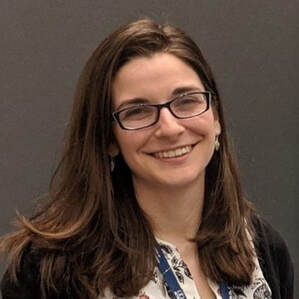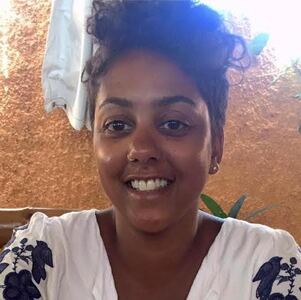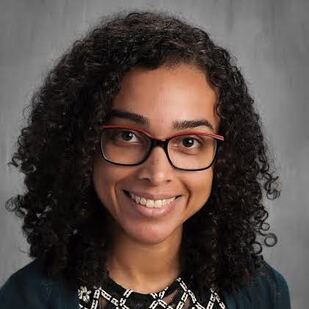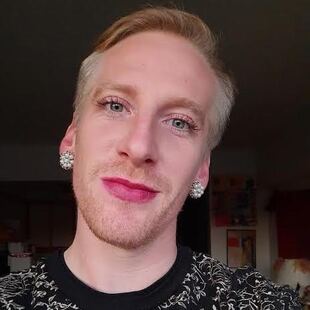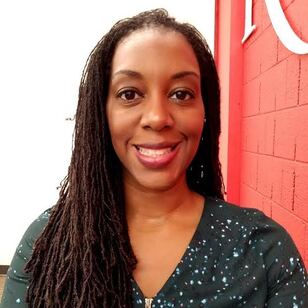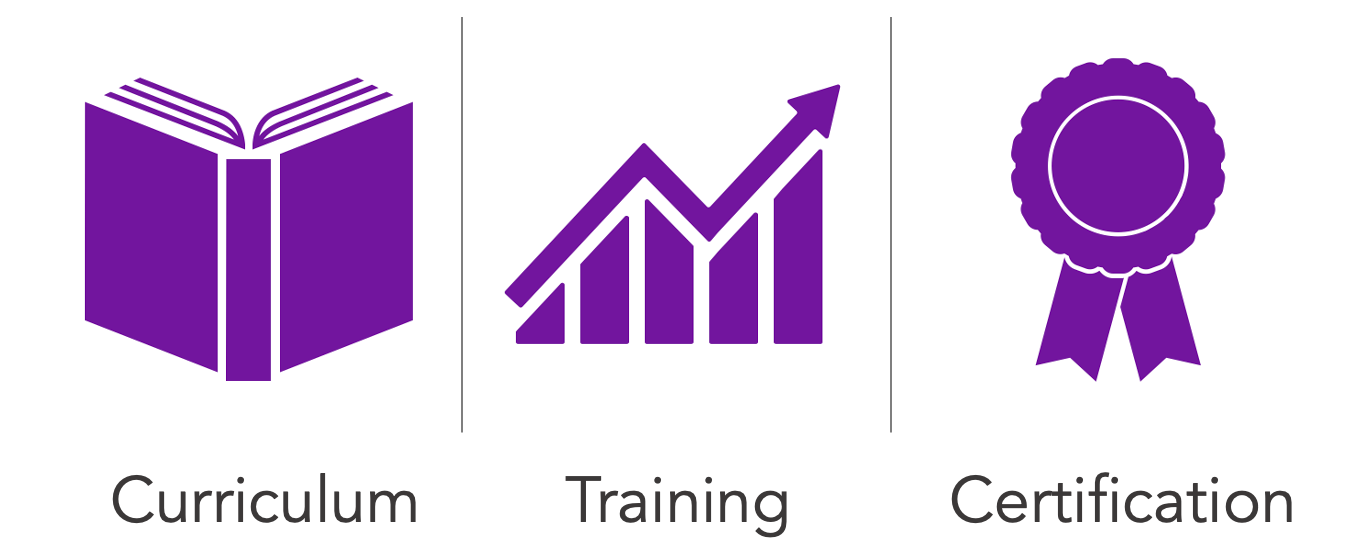How can K-12 teachers & staff become Educators for Gender Equity?
How does the program work?
To become an Educator for Gender Equity, K-12 teachers and staff complete at least one course in all six areas, including an 8-hour course on Foundations Gender Equity (orange) and participation in a community-centered monthly cohort meeting, for a total of 40 hours. They may complete their coursework in-person or online. Because no two educators and no two communities are alike, we provide a wealth of options including role-specific applications. After all, a kindergarten teacher from Denver, CO needs different skills and knowledge than a high school guidance counselor from Newark, NJ needs. Our balance of core foundations and choice ensures that all k-12 teachers and staff learn what they need to be Educators for Gender Equity.
Why 5 stripes and a button?
Each of the 5 stripes represents an essential component to becoming an educator for gender equity. At the center of our approach is the button that binds the strands together. This button symbolizes the community-building component at the heart of our certification program. Every educator will be put into a cohort so that they can learn and grow with one another and form the relationships that are fundamental to maintaining equity and inclusion work over the long-term.
| how_do_we_certify_educators_for_gender_equity__program_overview.pdf | |
| File Size: | 4780 kb |
| File Type: | |
|
Foundations
|
An Educator for Gender Equity understands how to honor all genders, stay informed about evolving conversations about identity, and talk with young people about these issues.
|
In this course, we provide all our educators with a common language for growth, discuss goals and go over ways that gender equity can enrich every aspect of school life.
|
|
Equity
|
An Educator for Gender Equity embraces how other aspects of identity, especially race, cannot be separated from gender identity and ensures that students can be fully themselves in the classrooms and hallways of their school.
|
In recognition of the particularly important influence race has in contemporary American life, educators are required to learn about the many and varied ways race shapes the experience of gender and vice-versa. Sample courses include:
|
|
Liberatory Practices
|
An Educator for Gender Equity cultivates communities of respect where everyone has the same opportunities to learn, thrive and lead regardless of gender.
|
Here’s where K-12 educators can get the specific practices and knowledge necessary for their community. Sample courses include:
|
|
Liberatory Applications
|
An Educator for Gender Equity teaches content and uses practices in their specific role that encourage gender equity.
|
Here’s where folks can get concrete practices and specific knowledge necessary for their role. Sample courses include
|
|
Capstone Contribution
|
An Educator for Gender Equity creates educational resources that further equity in K-12 schools.
|
As capstone project, educators submit a teaching resource for K-12 classrooms to our online platform, Teach About Power.
|
|
Community
|
An Educator for Gender Equity understands how to honor all genders and stay informed about evolving conversations about identity.
|
An Educator for Gender Equity supports other educators in their journeys and seeks their advice and insight in order to stay informed and responsive to evolving conversations about identity
|
What do we need?
To get started: We need $25,000 to pilot our certification program in with 50 teachers 5 schools ($500/educator).
To sustain: We need $200,000 to bring our program to 500 teachers and make an impact on 50,000 students ($400/educator). With this amount, we can ensure that our certification program growth through strategic school partnerships. We won't need to do any more major fundraising.
To make a nationwide impact: $3.5million to train and certify 10,000 K-12 teachers to make an impact on 1,000,000 students ($350/educator). With this amount, we can ensure that our certification becomes a force for good on the national stage within a few years.
See more budget details here.
To sustain: We need $200,000 to bring our program to 500 teachers and make an impact on 50,000 students ($400/educator). With this amount, we can ensure that our certification program growth through strategic school partnerships. We won't need to do any more major fundraising.
To make a nationwide impact: $3.5million to train and certify 10,000 K-12 teachers to make an impact on 1,000,000 students ($350/educator). With this amount, we can ensure that our certification becomes a force for good on the national stage within a few years.
See more budget details here.
Who designed it?
Carolyn ChicaInclusive School Policies, from admissions to hiring, community-integrated DEI initiatives
BA, Stonybrook Univ. |
Dr. Brandie WaidQueer theory, anti-bias mathematics; Innovating STEM
PhD, Columbia Teachers College |
Chiarna MortonCommunity- and cause-driven pedagogy & DEI initiatives
DEI Director, St Luke's School |
Kemeyawi WapepahDEI initiatives, Native and Indigenous Studies, qualitative research
BA, PhD Candidate, Harvard |
Griffin PayneTransliberation, transformative institutions & applied frameworks, Professional Coaching & Change-implementation
MA, Concordia |
Dr. Leah OwensSocial justice, integrating scholarship and activism
BA, Duke | PhD, Rutgers University |
Program Director: Georgina Emerson, Founder/Director of Teach About Women
Diversity and inclusion are central to our mission.
At Teach About Women, we believe our work is strongest when our team reflects the tremendous diversity of the students, families, and educators we serve. In our community, we value a wide range of identities and experiences. We define ‘women’ broadly, welcoming those who identify as femme, trans, non-binary, and gender expansive. Following the lead of Dr. Kimberlé Crenshaw, we also acknowledge that many women face multiple and intersecting forms of oppression. We actively seek to address the ways that gender intersects with systems of oppression such as racism, classism, ableism, heterosexism, colonialism, and xenophobia. We recruit BIPOC and LGBTQIA+ educators and seek to partner with organizations from communities that have been historically underserved by America’s schools.

